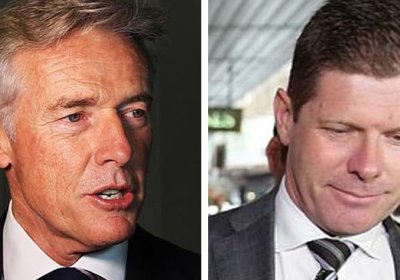The age of entitlement might be over for some, but the spooks are not among them. There are six security and intelligence services in Australia, the largest of which is the Australian Security Intelligence Organisation (ASIO).
In 2004, it was getting by with 700 staff and a budget of $150 million. Now it has a staff of 1780 with a budget of $600 million at their disposal.
John Rainford
Two ministers and five backbenchers have been suspended from the Liberal Party in NSW as a consequence of Independent Commission Against Corruption (ICAC) investigations over the past couple of months.
The latest ICAC hearings, which resumed on August 4, are centred on illegal donations from property developers in Newcastle and the Central Coast.
When Labor Premier Nathan Rees banned these donations in November 2009, it was not well received by significant groupings in the Liberal and Labor parties.
One of the promises Prime Minister Tony Abbott made when he was elected last year was to create 1 million jobs over the next five years. This translates to a monthly increase of about 17,000 jobs. Yet in the 10 months since September last year, only 11,000 jobs a month have been created – and more than half of these were part-time jobs.
Students and staff at the University of Wollongong (UOW) held a forum on August 7 to discuss the impact the higher education cuts proposed by the federal government would have on the university.
The forum was organised by UOW Uncut, a new group of staff and students who are campaigning against the funding cuts.
The anger was palpable among the 60 people who attended the forum, chaired by UOW National Tertiary Education Union branch president Joanne Buckskin, and addressed by NTEU NSW secretary Genevieve Kelly, staff member Alexander Brown, and student Ben Kohler.
The serious financial fraud that surfaced in the scandal-ridden Health Services Union (HSU) provided the federal government with a handy excuse to establish the Royal Commission into Trade Union Governance and Corruption.
Although the commission has powers wide enough to inquire into all unions, the HSU is one of five organisations specifically mentioned in its terms of reference alongside the Australian Workers Union, Communications Electrical Plumbing Union, Construction Forestry Mining Energy Union, and the Transport Workers Union.
Before the 2007 federal election, former Labor minister and ex-party president Barry Jones made a striking analogy between the ALP’s factionalism and its predilection for selling public assets. He said: “The ALP has been privatised and factions are majority and minority stakeholders, run by professional managers, some now in the third generation.”
Less than 18 months later, Queensland Labor Premier Anna Bligh won a state election on a platform that made no mention of privatisation.
In the first two weeks of hearings at the Royal Commission into Trade Union Governance and Corruption, further claims were made against Labor leader and former national secretary of the Australian Workers Union (AWU) Bill Shorten.
Former Health Services Union (HSU) official Marco Belano told the commission that Shorten donated $5000 to his 2009 union election campaign when Shorten was parliamentary secretary for disabilities in the Labor government.
The revolution might not be televised, but you can see the Royal Commission into Trade Union Governance and Corruption proceedings live-streamed into your lounge room.
Such is the overwhelming public demand for riveting daytime televised reality shows that the commission is competing with Judge Judy in bringing this much-awaited courtroom drama to a computer near you via a mere click on their website.
The proceedings began in earnest on June 10, but much of what was heard in evidence has been well rehearsed in the Murdoch press over the past couple of years.
The NSW Independent Commission Against Corruption (ICAC) has again found former Labor powerbroker Eddie Obeid guilty of corruption.
On June 5, he was found corrupt over the non-disclosure of the ownership of cafes at Circular Quay and attempts to renew the leases without them going to tender.
The global financial crisis had its origins in the US when interest rates fell from 6% in January 2001 to 1% in mid-2003. This led to banks and other financial institutions awash with cheap money to conclude that lending to home buyers at obvious risk of defaulting their repayments was a safe bet.
In the 18th and 19th century, scientists often used themselves as guinea pigs in the course of conducting experiments to determine the causes of disease and test the efficacy of new drugs.
One of the earlier and more heroic examples comes from the Scottish physiologist and surgeon John Hunter (1728-93). Hunter was investigating syphilis, a disease surrounded by secrecy and shame whose origins were unlikely to be acknowledged at any level. The French called it the Italian disease and the Italians called it the French disease.
While attacking pensioners, the unemployed, single parents and the marginalised, the Coalition government has stepped up its attack on the organised.
There are two inquiries aimed at unions underway — a Productivity Commission inquiry into the Fair Work Act and the Royal Commission into Trade Union Governance and Corruption. Both are designed to emasculate an already legislatively constrained union movement.
For good measure, Attorney-General George Brandis has now added a third.
- Previous page
- Page 9
- Next page







